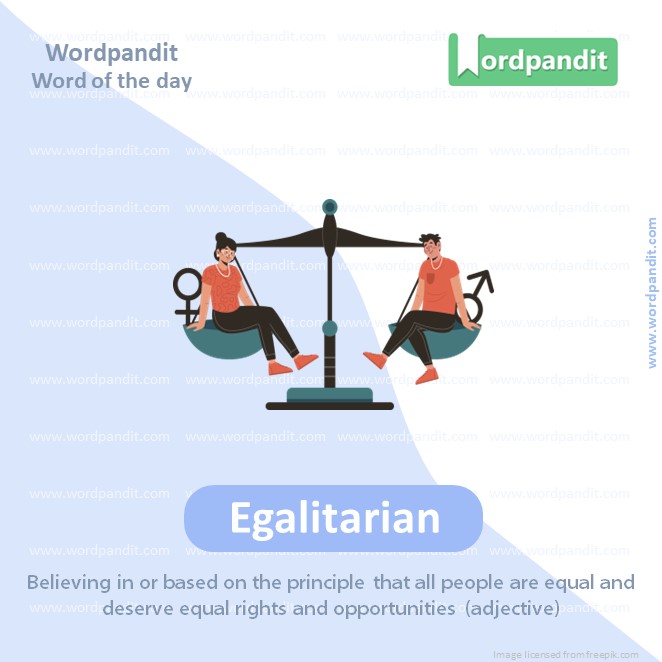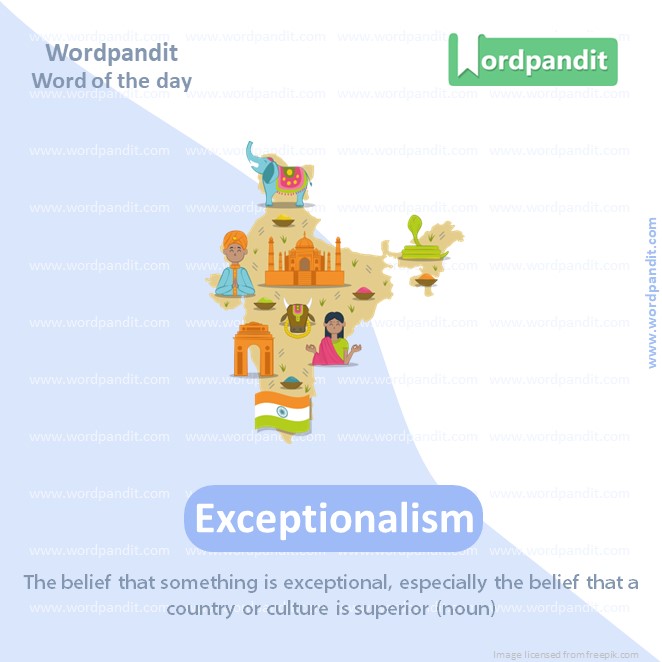Daily Vocabulary from International Newspapers and Publications
Expand Your Vocabulary with Wordpandit’s Global Vocabulary Hub
At Wordpandit, we are committed to helping you develop a truly global vocabulary by drawing from some of the most respected international publications. This section is designed to keep you ahead of the curve by introducing you to words that define global conversations and trends.
The Power of Global Sources
To help you think and communicate on a global scale, we curate vocabulary from renowned international sources, such as:
- The New York Times
- The Washington Post
- BBC
- The Guardian
- The Economist
- Scientific American
- Psychology Today
- And many more...
Stay Global, Stay Competitive
Our daily updates from international publications ensure you are consistently exposed to new words that reflect global news and developments, making sure your vocabulary is not only current but also globally relevant.
Enhance Your Global Perspective
Whether you’re preparing for international exams, aiming to excel in global business communication, or want to enhance your language skills for personal growth, Wordpandit offers the resources you need to thrive in a global context.
Effective Learning, Global Reach
Our learning methodology combines global examples, memory aids, and interactive activities, allowing you to internalize new words effectively and apply them in real-world scenarios.
Begin Your Global Vocabulary Journey Now!
Why Choose Wordpandit?
Practical Learning: Focus on words you'll actually encounter in real-world reading, enhancing your comprehension and communication skills.
Diverse Content: From current affairs to scientific breakthroughs, our varied sources expose you to vocabulary across multiple domains.
Effortless Integration: Make Wordpandit a part of your daily routine. Just a few minutes each day can significantly boost your lexicon over time.
Your Path to Vocabulary Mastery
- Visit our Daily Vocabulary section regularly
- Explore new words and their usage in context
- Practice incorporating these words into your own writing and speech
- Track your progress as your vocabulary expands
Start Your Journey Today
Embark on your vocabulary enhancement journey with Wordpandit. By consistently engaging with our daily posts, you'll build a robust vocabulary that serves you well in academic, professional, and personal contexts.
Remember, a word a day keeps linguistic limitations at bay. Make Wordpandit your daily companion in the quest for vocabulary excellence!
WORD-1: Egalitarian
Context:
"Jaishankar has made the case that India’s rise is not only ushering in a multipolar distribution of economic and military power but also a more egalitarian world where alternative civilisations and ideas have influence." - Hindustan Times
Explanatory Paragraph:
The word "egalitarian" refers to the principle or belief in equality — particularly social, political, and economic equality for all people. An egalitarian world is one in which everyone, regardless of their background or status, has equal rights, opportunities, and influence. In this context, it suggests a shift from dominance by a few powerful nations to a more balanced global order where diverse voices and cultures are valued equally.
Meaning: Believing in or based on the principle that all people are equal and deserve equal rights and opportunities (Adjective/Noun)
Pronunciation: ih-gal-uh-TAIR-ee-uhn
Difficulty Level: ⭐⭐⭐ Intermediate
Etymology: From French *égalitaire*, from *égal* meaning "equal", which comes from Latin *aequalis*.
Prashant Sir's Notes:
Think of "egalitarian" as someone who opposes hierarchy and favors fairness. In exams, it often appears in political, social, or philosophical discussions — remember it as the opposite of elitist or authoritarian.
Synonyms & Antonyms:
Synonyms: equalitarian, democratic, unbiased, impartial, fair-minded
Antonyms: elitist, hierarchical, discriminatory, unequal, authoritarian
Usage Examples:
- The company prides itself on its egalitarian culture, where every employee's opinion matters.
- She advocated for an egalitarian education system that provides the same opportunities to all children.
- His egalitarian beliefs clashed with the rigid class structures of the time.
- Modern democracies aim to create a more egalitarian society through equal rights legislation.
Cultural Reference:
"All animals are equal, but some animals are more equal than others." - George Orwell, *Animal Farm* (A critique of false egalitarianism under authoritarian regimes)
Think About It:
Can a society truly be egalitarian, or are hierarchies and inequalities inevitable in human communities?
Quick Activity:
List two policies from any country that promote an egalitarian society. Briefly explain how they reduce inequality.
Memory Tip:
Think of “E-Gal” — “Equal for Gals and Guys.” Helps you remember it's about equality for all!
Real-World Application:
The term “egalitarian” is often used in political debates, HR policies, and education reforms when discussing equal rights and fair treatment — from gender pay equity to accessible healthcare and inclusive governance.
WORD-2: Exceptionalism
Context:
"He talks of an Indian exceptionalism with ‘a different level of culture and heritage, with accompanying attitudes and mindset’ that sets Bharat apart from the United States and China." - Hindustan Times
Explanatory Paragraph:
"Exceptionalism" refers to the belief or perception that a particular nation, group, or society is inherently different from and superior to others, often due to unique historical, cultural, or ideological attributes. In the context of the sentence, Indian exceptionalism highlights the idea that India possesses a distinctive identity shaped by its civilization, culture, and values, setting it apart from other major powers like the U.S. and China.
Meaning: The belief that a nation or group is unique and superior, often due to its values, history, or mission (Noun)
Pronunciation: ek-SEP-shuh-nuh-liz-um
Difficulty Level: ⭐⭐⭐⭐ Advanced
Etymology: Derived from the word "exceptional" (from Latin *exceptio* meaning 'a taking out') + suffix *-ism* indicating a belief or ideology.
Prashant Sir's Notes:
This word is often used in geopolitical or ideological discussions — think “American exceptionalism” or “civilizational exceptionalism.” It’s important to note that this belief can be seen both positively (pride) and critically (arrogance).
Synonyms & Antonyms:
Synonyms: uniqueness, distinctiveness, superiority, singularity
Antonyms: universality, equality, conformity, normalcy
Usage Examples:
- American exceptionalism is often cited to justify its unique role in global affairs.
- The leader promoted a sense of cultural exceptionalism to inspire national pride.
- Critics argue that exceptionalism can lead to a dismissive attitude towards global cooperation.
- Her book explores Indian exceptionalism through the lens of ancient philosophy and diversity.
Cultural Reference:
"We are the last best hope of Earth." – Abraham Lincoln (often quoted in support of American exceptionalism)
Think About It:
Does believing in a nation's exceptionalism help build unity and pride, or does it risk alienating others and encouraging isolation?
Quick Activity:
Write a short paragraph about a country or culture you think exhibits exceptionalism. What makes it stand out?
Memory Tip:
Think “exceptional” + “-ism” — a belief in being the exception, or being uniquely superior.
Real-World Application:
"Exceptionalism" is often used in political speeches, academic essays, and cultural commentary to describe how countries view themselves in relation to the world — whether it's the U.S.'s global leadership claims or India's civilizational pride.
WORD-3: Presiding
Context:
"It has also given due importance to the opinion of the presiding judge of the trial court as 'an independent authority which must be consulted'." - Hindustan Times
Explanatory Paragraph:
"Presiding" refers to the act of being in a position of authority, especially in a formal setting like a meeting, court, or official ceremony. A "presiding judge" is the one who oversees and manages court proceedings, ensuring that the trial is conducted fairly and according to the law. In this context, the term emphasizes the significance and responsibility of the judge leading the trial.
Meaning: Acting as the person in charge of a formal meeting or official process (Verb/Adjective)
Pronunciation: prih-ZY-ding
Difficulty Level: ⭐⭐ Basic
Etymology: From Latin *praesidere* meaning "to superintend, watch over," from *prae-* (before) + *sedere* (to sit).
Prashant Sir's Notes:
“Presiding” is commonly seen in legal, political, and formal contexts. Think of someone “sitting in authority” — like a presiding officer in Parliament or a presiding judge in a courtroom.
Synonyms & Antonyms:
Synonyms: overseeing, managing, officiating, chairing, leading
Antonyms: following, participating, attending, obeying
Usage Examples:
- The minister is presiding over the high-level policy review meeting today.
- The presiding officer ensured that the voting process was free and fair.
- Justice Mehta was the presiding judge during the landmark case.
- She is presiding at the annual board meeting as the chairperson of the committee.
Cultural Reference:
In the U.S. Senate, the Vice President acts as the *presiding officer* but votes only to break ties — highlighting the ceremonial and decisive role of presiding figures in governance.
Think About It:
Why is the role of a presiding authority critical in ensuring fairness and order during legal or political proceedings?
Quick Activity:
Name three formal situations where someone might be "presiding." Write down who that person usually is in each case (e.g., a judge in court).
Memory Tip:
Think of “presiding” as “pre-sitting” — the one who sits before others, i.e., in a position of authority.
Real-World Application:
"Presiding" is often used in courts, legislative assemblies, corporate boardrooms, and religious ceremonies — any setting where a leader oversees proceedings and ensures order.
WORD-4: Remission
Context:
"Having completed 14 years of imprisonment, the convicts applied for remission and the state of Gujarat vide its orders dated August 10, 2022, prematurely released them." - Hindustan Times
Explanatory Paragraph:
"Remission" in legal and correctional contexts refers to the reduction of the duration of a prison sentence. It is often granted based on good behavior, special circumstances, or policy decisions by the state. In this case, after serving 14 years, the convicts applied for remission — meaning they requested an early release — and the state granted it, allowing them to be freed before completing their full term.
Meaning: A reduction or cancellation of a prison sentence, debt, or penalty (Noun)
Pronunciation: ruh-MISH-un
Difficulty Level: ⭐⭐⭐ Intermediate
Etymology: From Latin *remissio*, meaning "relaxation, forgiveness", from *remittere* ("to send back, release").
Prashant Sir's Notes:
In legal vocabulary, "remission" is a technical term. Don’t confuse it with its medical use (temporary reduction of symptoms). In judicial contexts, it implies a pardon or early release, typically after a portion of the sentence is served.
Synonyms & Antonyms:
Synonyms: pardon, clemency, reduction, reprieve, leniency
Antonyms: penalty, punishment, enforcement, continuation
Usage Examples:
- After serving two-thirds of his sentence, he was granted remission for good conduct.
- The policy allows for remission of fines under certain humanitarian grounds.
- The prisoner’s legal team filed a request for sentence remission based on health concerns.
- Remission is not the same as acquittal — it reduces punishment but does not erase the conviction.
Cultural Reference:
In India, remission policies differ by state and are influenced by the CrPC and jail manuals — famously debated in the Bilkis Bano case where convicts were released early through remission.
Think About It:
Should remission be granted automatically after a certain period, or should it always depend on the nature of the crime and conduct of the convict?
Quick Activity:
List two arguments *for* and *against* granting remission to long-term convicts. Share your opinion in one sentence.
Memory Tip:
Think of “re-mission” as “releasing from a mission (sentence).” A way to remember it as reducing or ending a punishment.
Real-World Application:
"Remission" plays a key role in the criminal justice system — affecting parole decisions, prison population control, and rehabilitation policies. It's often part of debates on justice vs. mercy.
WORD-5: Meticulously
Context:
"Advocate Vrinda Grover and her team took it up pro bono and followed it meticulously through the legal labyrinth." - Hindustan Times
Explanatory Paragraph:
"Meticulously" describes doing something with extreme attention to detail, care, and precision. It implies a thorough and diligent approach, leaving nothing to chance. In the context above, it means that Advocate Vrinda Grover and her team pursued the legal case with great care, carefully analyzing each step, ensuring accuracy, and paying close attention to every detail of the complex legal process.
Meaning: In a way that shows great attention to detail; very thoroughly (Adverb)
Pronunciation: muh-TIK-yuh-lus-lee
Difficulty Level: ⭐⭐⭐ Intermediate
Etymology: From Latin *meticulosus* meaning "fearful," later evolving to imply a careful, exact approach due to fear of making a mistake.
Prashant Sir's Notes:
This is a high-frequency adverb in academic, legal, and descriptive writing. Use it to describe actions done with precision. Great word for essays where you want to highlight thorough effort or attention to detail.
Synonyms & Antonyms:
Synonyms: carefully, thoroughly, precisely, attentively, painstakingly
Antonyms: carelessly, hastily, sloppily, roughly, negligently
Usage Examples:
- The architect meticulously checked every measurement before finalizing the design.
- She planned the wedding meticulously, down to the last flower petal.
- The scientist meticulously recorded each observation in his lab notebook.
- The crime scene was meticulously examined for any trace of evidence.
Cultural Reference:
In popular culture, characters like Sherlock Holmes are often portrayed as *meticulously* analyzing clues — emphasizing logical precision and attention to every detail.
Think About It:
Is being meticulous always a strength, or can it sometimes slow down decision-making and progress?
Quick Activity:
Write two sentences: one using “meticulously” in a personal achievement, and another where being meticulous helped someone else.
Memory Tip:
“Meticulously” has “tick” in it — like a ticking clock, reminding you to be precise and on point with every second and detail.
Real-World Application:
"Meticulously" is commonly used in legal, academic, scientific, and professional environments to emphasize thoroughness — whether it's filing paperwork, writing reports, or analyzing data.



















